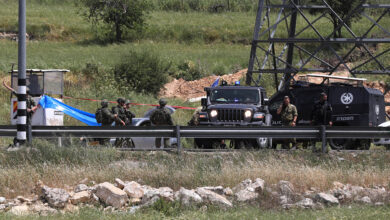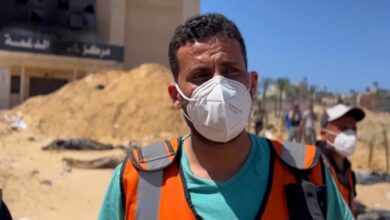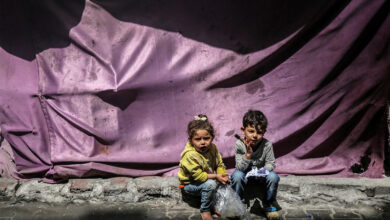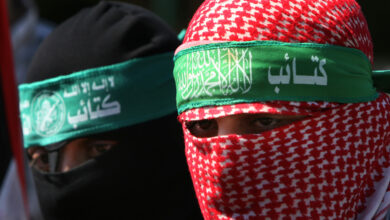Protestors of the Gaza Freedom March continued their actions in Cairo’s downtown today, Thursday, amidst strict security measures that include preventing them from leaving their hotels and disrupting their planned gathering in downtown Tahrir Square with alleged acts of violence. According to a press release from the March issued this morning, "Reports of police brutality are flooding a delegate legal hotline … The reports span from women being kicked, beaten to the ground and dragged into pens, at least one confirmed account of broken ribs, and many left bloody."
The Gaza Freedom March is an international coalition of activists who planned to protest the siege by marching to Gaza’s Erez border crossing with Israel after entering the Strip through the Egyptian border crossing at Rafah. The government of Egypt has foiled their plans by denying the protesters entry to Gaza. However, late on Tuesday, President Hosni Mubarak’s Suzanne Mubarak allowed a contingent of 100 marchers to go to Gaza via the border town of Rafah. The decision caused divisions within the march, but according to Zyaad Lunaat, "The official Gaza Freedom March position is that we refuse the offer. Some individuals decided to go on their own accord." The pledge by the Egyptian government was perceived as a compromise on the demand to let more than 1000 activists transiting in Cairo to cross to Gaza and perhaps also a strategy to divide the group. Meanwhile, on Tuesday, about 300 protesters convened outside the doors of the Journalists’ Syndicate in downtown Cairo to protest the siege on Gaza and Israeli Prime Minister Benjamin Netanyahu’s visit to Cairo. Two rows of riot police cordoned off the protesters and kept broadcast media away.
This strong security presence is common in demonstrations around Egypt, a state in which emergency law prohibits public associations. Activism around the Palestinian question has been scrutinized by state security, which response ranges between taming planned actions and intimidating its organizers. Opinions differ on the Egyptian position vis a vis popular sentiments towards the Palestinian question, with some affirming that the regime is far from endorsing those sentiments, while others claiming the opposite.
Philip Rizk, a blogger and filmmaker, was kidnapped and detained by security forces last February after he organized a march from Cairo to Gaza with local and international activists. “Throughout the interrogation, my biggest crime seemed to be one simple thing: I cared too much for Palestinians and was willing to turn this solidarity into action,” says Rizk, 27, who lived and worked in Gaza for two years.
“Throughout my abduction I heard people screaming while being tortured and my interrogators kept reminding me that I was intelligent enough to understand what was going on and that the same would happen to me if I did not tell them the truth,” he recalls. “At different moments my interrogators tried to accuse me of being an Israeli spy and a weapons dealer for Hamas, making me feel like I was doing something very very wrong, something that was an unpardonable crime. The line of logic seemed to be if you are protesting on behalf of Palestinians, then we–the paternalistic state apparatus–will identify you as a spy or terrorist, which is as non-patriotic as one can be. Little did they know that this sort of threat did not bother me much, as I couldn’t care less about patriotism or being perceived as a patriot in the traditional sense. What I care about is people, not states.”
Rizk’s encounter with the security did not deter him from pursuing his activism. He stood in Tuesday’s protest, chanting with the crowd, “to Gaza we will go” and “down with the wall,” referring to an underground steel barrier being built by Egypt on its border with Gaza in an attempt to curb smuggling.
But not every activist shares Rizk’s perseverance. Muhammad Waked, a researcher with the Socialist Studies Center, says the Egyptian government has successfully engineered a strategy that causes fatigue among activists for the Palestinian cause. “The regime has not only been coercive but hegemonic. Its strategy has proved to work, especially in mobilizing the media to send terrorizing messages in cases like the Hizbullah cell and the opening of the Gaza border in 2008. It’s very similar to the American government media scare about weapons of mass destruction in Iraq ahead of its invasion,” says Waked.
The Hizbullah cell case is an ongoing trial in which last year Egyptian state security has accused a contingent of the Lebanese militia of plotting attacks on Egyptian territories. The 2008 border opening refers to an incident where the wall separating Gaza and Egypt broke open, allowing thousands of Palestinians to enter Egypt. Egypt has repeatedly used both incidents as examples of the dangers to national security from Gaza.
“The Egyptian regime cannot accept or tolerate any Palestinian sentiments, especially that they don’t divert masses away from domestic issues, but rather channel back to them,” says Waked. Waked was also at Tuesday’s demonstration where activists eventually chanted, “down with Mubarak” and carried signs reading, “The liberation of Gaza starts with the liberation of Cairo.” Other signs read, “Mubarak and Netenyahu are partners in crime.”
Waked says that Egypt’s trade deals with Israel, including natural gas exports and the Qualified Industrial Zones agreement, as well as the government’s mild position during Israel’s attacks on Lebanon in August 2006, were all read as signs of not only diminishing Egyptian support to the Palestinian cause, but also diminishing interest in endorsing solidarity actions.
But Gamal Zyada, a columnist with al-Ahram, disagrees. "The Palestinian question has always been part of the value system in Egypt and the regime understands and accommodates this." According to him, very little is known about the Palestinian leaders’ recognition of Egypt’s vital role to their cause. "Hamas, one of the most radical Palestinian political voices has just confided that Egypt is the only Arab state able to handle the Palestinian question," says Zyada.
For General Fouad Allam, who headed state security in Egypt for 20 years, the crackdown on protestors is simply an implementation of the emergency law that prohibits public gatherings. “The argument used by the security to crackdown on protestors is the fact that the law prohibits public gatherings and that those demonstrations disturb public order. Both arguments are true,” he says.
Asked whether this crackdown corresponds to the regime’s overall approach to the Palestinian question, Allam says no. “The way this crackdown is articulated gives the impression that the regime is fearful and is all about stopping this expression. That’s not true and the proof is that protests are generally allowed if a permission is taken ahead of time.” According to Allam, this impression can be broken by applying more subtlety when controlling demonstrations, such as relying less on the massive numbers of riot police, using more plain cloths policemen instead, and allocating certain places, away from city centers, to stage demonstrations.
But activists maintain that for Palestinian activism to survive, there must be numbers. “Many people are scared to protest, which makes complete sense when the usual response to merely saying you disapprove of what your government is doing can very well result in being beaten up by government thugs, being jailed and often tortured. When protests are big enough, people are no longer afraid to say what they really have pent up inside them,” says Rizk.




